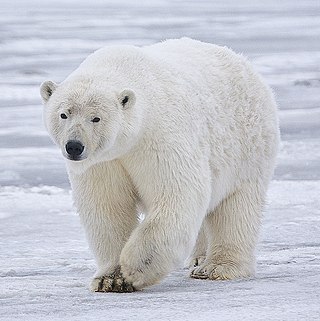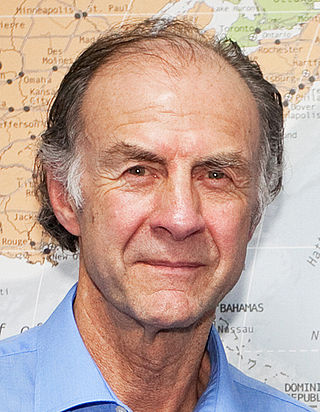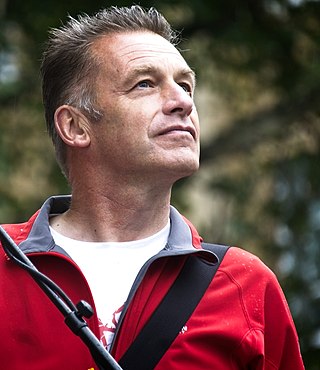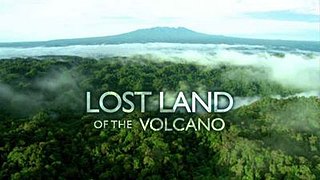
The polar bear is a large bear native to the Arctic and surrounding areas. It is closely related to the brown bear, and the two species can interbreed. The polar bear is the largest extant species of bear and land carnivore, with adult males weighing 300–800 kg (700–1,800 lb). The species is sexually dimorphic, as adult females are much smaller. The polar bear is white- or yellowish-furred with black skin and a thick layer of fat. It is more slender than the brown bear, with a narrower skull, longer neck and lower shoulder hump. Its teeth are sharper and more adapted to cutting meat. The paws are large and allow the bear to walk on ice and paddle in the water.

Louis Sebastian Theroux is a British-American documentarian, journalist, broadcaster, and author. He has received three British Academy Television Awards and a Royal Television Society Television Award.

Bear Island is the southernmost island of the Norwegian Svalbard archipelago. The island is located at the limits of the Norwegian and Barents seas, approximately halfway between Spitsbergen and the North Cape. Bear Island was discovered by Dutch explorers Willem Barentsz and Jacob van Heemskerck on 10 June 1596. It was named after a polar bear that was seen swimming nearby. The island was considered terra nullius until the Spitsbergen Treaty of 1920 placed it under Norwegian sovereignty.

Sir Ranulph Twisleton-Wykeham-Fiennes, 3rd Baronet, commonly known as Sir Ranulph Fiennes and sometimes as Ran Fiennes, is a British explorer, writer and poet, who holds several endurance records.

William Speirs Bruce was a British naturalist, polar scientist and oceanographer who organized and led the Scottish National Antarctic Expedition to the South Orkney Islands and the Weddell Sea. Among other achievements, the expedition established the first permanent weather station in Antarctica. Bruce later founded the Scottish Oceanographical Laboratory in Edinburgh, but his plans for a transcontinental Antarctic march via the South Pole were abandoned because of lack of public and financial support.
John Gordon Sinclair is a Scottish actor. He is best known for playing Gregory in the 1981 film Gregory's Girl. There was a Gordon Sinclair already registered with Equity, so he took John Gordon Sinclair as his professional name. In 2019, Sinclair played Drew Cubbin in the BBC drama Traces.

Christopher Gary Packham CBE is an English naturalist, nature photographer, television presenter and author, best known for his television work including the CBBC children's nature series The Really Wild Show from 1986 to 1995. He has also presented the BBC nature series Springwatch, including Autumnwatch and Winterwatch, since 2009.

Alastair David William Fothergill is a British producer of nature documentaries for television and cinema. He is the series producer of the series The Blue Planet (2001), Planet Earth (2006) and the co-director of the associated feature films Deep Blue and Earth.

Earth is a 2007 nature wildlife documentary film which depicts the diversity of wild habitats and creatures across the planet. The film begins in the Arctic in January of one year and moves southward, concluding in Antarctica in the December of the same year. Along the way, it features the journeys made by three particular species—the polar bear, African bush elephant and humpback whale—to highlight the threats to their survival in the face of rapid environmental change. A companion piece and a sequel to the 2006 BBC/Discovery television series Planet Earth, the film uses many of the same sequences, though most are edited differently, and features previously unseen footage not seen on TV.

The BBC Wildlife Specials are a series of nature documentary programmes commissioned by BBC Television. The series premiered in 1995, and 22 specials have been produced to date, with most of the more recent ones consisting of multiple episodes. The earlier programmes were produced in-house by the BBC's Natural History Unit, but the more recent Spy in the ... titles were made by the independent John Downer Productions. The first 18 specials, through 2008, were narrated by David Attenborough. Polar Bear: Spy on the Ice (2010), Penguins: Spy in the Huddle (2013) and Dolphins: Spy in the Pod (2014) were narrated by David Tennant.

Frozen Planet is a 2011 British nature documentary series, co-produced by the BBC and The Open University. It was filmed by the BBC Natural History Unit. The production team, which includes executive producer Alastair Fothergill and series producer Vanessa Berlowitz, were previously responsible for the award-winning series The Blue Planet (2001) and Planet Earth (2006), and Frozen Planet is billed as a sequel of sorts. David Attenborough returns as narrator. It is distributed under licence by the BBC in other countries, Discovery Channel for North America, ZDF for Germany, Antena 3 for Spain and Skai TV for Greece.

Gordon John Buchanan is a Scottish wildlife filmmaker and presenter. His work includes the nature documentaries Tribes, Predators & Me, The Polar Bear Family & Me and Life in the Snow.
Grey Goose Island is one of several, larger, uninhabited Canadian arctic islands in Nunavut, Canada located within the midsection of James Bay. Other comparable islands in the area include the Bear Islands, North and South Twin Islands, Spencer Island, Sunday Island, and Walter Island. La Grande River and the Cree village of Chisasibi, Quebec are 65 km (40 mi) to the southeast.

Lost Land of the Volcano is a three-part nature documentary series produced by the BBC Natural History Unit which follows a scientific expedition to the island of New Guinea. The expedition team, which includes specialist zoologists, explorers and the BBC crew, travels to the extinct volcano of Mount Bosavi in central Papua New Guinea to document the biodiversity of this little-visited area and search for new species. At the time of filming, logging was taking place about 20 miles (32 km) south from the volcano, and one of expedition's aims was to find evidence to support the case to protect the area. Some members of the expedition team travelled to the island of New Britain several hundred kilometres to the east to chart an unexplored cave system and observe an active volcano.
The Bear Family & Me is a three-part nature documentary series produced by the BBC Natural History Unit. It follows wildlife cameraman Gordon Buchanan as he spends a year with a family of wild black bears, under the guidance of biologists Lynn Rogers and Sue Mansfield of the North American Bear Centre.
Keith Scholey is a British producer of nature documentaries for television and cinema, and a former television executive. He is the joint series producer of the Netflix original documentary series Our Planet, the joint director and executive producer of David Attenborough: A Life on Our Planet, and executive producer of Breaking Boundaries: The Science of Our Planet. He is the executive producer of the 2021 BBC / Discovery series A Perfect Planet, The Mating Game and The Earthshot Prize: Repairing Our Planet. He also co-directed African Cats, Bears, and Dolphin Reef with Alastair Fothergill for Disneynature, and is also the executive producer of the series North America for the Discovery Channel.

The 2011 Svalbard polar bear attack was an attack by a presumed starving polar bear on a group of university students and their guides. The bear killed one person, injured four others, and was then shot.
The Dark: Nature's Nighttime World is a three-part nature documentary series produced by the BBC Natural History Unit which follows an expedition to Central and South America to film animals at night. The presenting team is made up of biologist Dr. George McGavin, large mammal expert Bryson Voirin and wildlife filmmakers Gordon Buchanan, Sophie Darlington and Justine Evans. They are equipped with the latest low-light filming technology, including thermal imaging and infrared cameras, enabling them to film natural behaviour without disturbing the wildlife, even in pitch-black conditions. During the course of the six-month expedition, the team visit five countries enlisting the help of local field scientists to locate and film rare species and new behaviour. The team obtain footage of nocturnal specialists such as vampire bats and owl monkeys and witness the nighttime activities of jaguars and pumas at close quarters.

Polar Bear is a 2022 American nature documentary film about polar bears directed by Alastair Fothergill and Jeff Wilson. Narrated by Catherine Keener, it is the sixteenth nature documentary to be released under the Disneynature label. The film was released as a Disney+ exclusive on Earth Day April 22, 2022.













